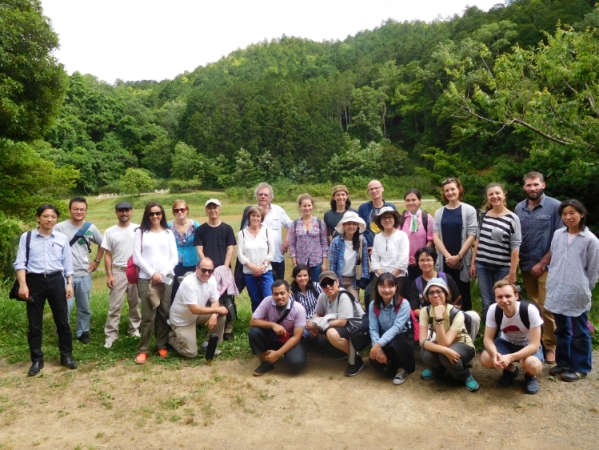The month of May was marked by several academic events organised by the Asian Platform of Global Sustainability and Transcultural Studies (AGST) Module 1. As part of the implementation of the Japan Gateway Programme, the AGST invited Jan Douwe van der Ploeg, Professor of Rural Sociology at Wageningen University (WU) in the Netherlands, and adjunct professor of transition studies at China Agricultural University in Beijing, to deliver an intensive course on peasant studies and agrarian transition. This intensive course was followed by the second workshop jointly organised by Kyoto University (KU) and the Rural Sociology Group of Wageningen University (RSO-WU) through the AGST partnership.
The workshop programme was divided into three parts: two days of interactive panel discussions in which the students from both universities presented their research followed by a public event jointly organised by the AGST and the Research Institute for Humanity and Nature (RIHN). Three prominent keynote speakers shared their ideas on the theme “Agroecology and peasant agriculture a promise for the future”, namely: Dr. Steven McGreevy, Associate Professor at RIHN; Miguel Altieri, Professor of Agroecology at the University of California, Berkeley; and Prof. Jan Douwe van der Ploeg. The third part of the joint workshop was dedicated to field visits in which all the participants had the chance to observe issues related to agriculture and rural development in Japan.
Intensive Course on Peasant Studies and Agrarian Change
The objective of this course was threefold. Firstly, to familiarise KU students interested in rural development, agriculture, food security, and agrarian political economy with the history and debates on peasant agriculture. The second objective was to introduce the concepts and various methodological approaches in the study and analysis of the peasantry and peasant agriculture. And finally, the course was designed to guide the students to identify ‘hot issues’ in current debates about agriculture and food, and how to relate these to the peasant question in a new era of global food insecurity.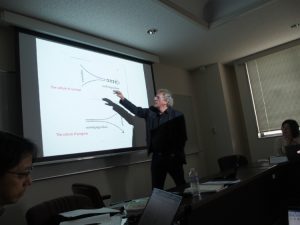
Six lectures were delivered for these purposes. In the first lecture, Prof. van der Ploeg defined what is peasant agriculture, what is peasantry, how to define peasant, and what are the differences between the capitalist or entrepreneurial agriculture and peasant agriculture. This content was drawn from his famous book “The New Peasantries: Struggles for autonomy and sustainability in an era of empire and globalisation” (2008) and his new book “Peasants and the Art of Farming: A Chayanovian manifesto” (2013). The second lecture was focused on the dynamics of peasant agriculture as well as its nexus with the capitalist society. The third lecture underlined different types of Chayanovian balances as social drivers that move peasant agriculture forward. The two ensuing lectures focused on the process of re-peasantisation, the construction of new nested markets and the underlying “struggles of the third kinds”, namely: resistance, autonomy and sustainability. Prof van der Ploeg concluded his lectures with a topic on the future of peasant studies followed by a discussion on how social sciences can help to strengthen peasant agriculture.
The Second KU-WU International Graduate Workshop on Food, Farm and Rural Development
On 23-27 of May, the AGST project hosted the second KU-WU “international workshop on food, farm and rural development”. The first part of the workshop was held at the Mizuho Hall, a conference room of the Graduate School of Economics (GSE), where the students from both universities presented their current research in an interactive panel format.
Dr. Hart Feuer, Assistant Professor of the Graduate School of Agriculture (GSA) opened the session followed by welcome addresses by Prof. Shuji Hisano and Dr. Joost Jongerden, in which they explained the milestones of the collaborations between the two universities, the purposes of the workshop, and the expected outcomes.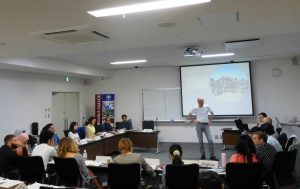
To explore this year’s topic of ‘Food, Farm and Rural Development’, the presentations were categorised according to four different sub-topics: 1) the political economy of food and rural transition; 2) Alternative Food Networks and sustainable agriculture; 3) place-based development and community livelihoods, and 4) the power of discourses and constitutional legitimacy.
The programme during the two consecutive days was as follows:
| The political Economy of food and rural transition; Chair: Dr Rajaonarison | |
|---|---|
| Herberito Ruiz Tafoya (KU-GSE, PhD Student) | Corporate Food and BoP Subsumption: A study of squatter areas in Metro-Manilla |
| Hiraga Midori (KU-GSE, PhD Student) | Transnational Policy on vegetable oil after WWII and its contributions to developing the global vegetable oil complex |
| Yang Xing (KU-GSE, PhD Student) | Capital to the countryside and financialisation of agriculture in China |
| Panel 2: Alternative Food Network and sustainable agriculture; Chair: Prof Hisano | |
|---|---|
| Leo Dvortsin (WU-RSO, PhD Candidate) | Mainstream alternative food networks: eating the way out of crisis |
| Ke Jinghan (KU-GSE, PhD Student) | Alternative food networks in China: A focus on vegetable provisioning system |
| Ryo Iwahashi (KU-GSA, PhD Student) | Consumer understandings of food information in food choice: reconnecting production and consumption |
| Panel 3: Place-based development and community livelihoods; Chair: Dr Jongerden | |
|---|---|
| Hilde Geerling (WU-SDC, PhD Candidate) | Food security, livelihoods and interventions |
| Flora Sonkin (WU-RSO, Master Student) | Geographies of connectivity: a relational perspective |
| Yuya IIDA (KU-GSA, PhD Student) | Selling our bodyweight: The Filipino migrant farm workers in Japan |
| Jordan Treakle (WU-RSO, Master Student) | Social Economy and place-based farm transition in Italy’s Garfagnana region: farm innovation, revalorisation, and specialisation towards multifunctional agriculture |
| Place 4: Power of discourse and constitution of legitimacy; Chair: Dr Ducan | |
|---|---|
| Zulfa Utami Adiputri (KU-GSE, PhD Student)) | Legitimacy of roundtable on sustainable palm oil in Melawi District |
| Anom Sygit Suryawan (KU-GSE, Master Student) | Religionisation of biotechnology: the role of halal certification and labelling schemes in maintaining bio-hegemony in Indonesia |
| Jonathan Tanis (WU-RSO, Master Student) | This Ephemeral Raft mythology and microbiopolitics of the living soil |
| Wang Yiming (KU-GSE, Research Student) | Food Security Policy of China From an international relations perspective |
In his closing address, Dr Jongerden underlined that this year’s workshop was very fruitful. He added that, although the two groups used different approaches, they both shared the same concerns regarding the theme that was explored during the two-day discussions. Furthermore, it was decided that the third KU-WU workshop will be held at Wageningen University in June/July 2017. Moreover, the AGST working paper series would be launched in the coming months to offer students and faculty members a platform to share their work before publishing them with highly ranked journals.
Agroecology and Peasant Agriculture a Promise for the Future
The second part of the workshop was devoted to a public event in which three distinguished presenters shared their ideas on the theme “Agroecology and peasant agriculture as a promise for the future”.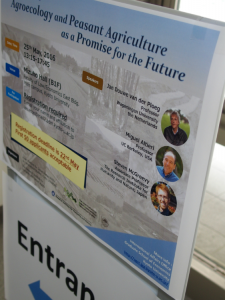
Prof. Hisano, in his opening remarks, explained the origin of the special lecture, including, the fortuitous synergy made possible by the collaboration between AGST and RIHN, who respectively invited Prof. Jan Douwe van der Ploeg and Prof. Miguel Altieri.
In order to contextualise the event, Prof. Hisano began his introductory address by highlighting growing concerns about food security in Japan. The response of the Japanese government has largely been to address these security concerns with a neoliberal policy. This is manifested, in particular, by the entry of non-agricultural private companies that have captured upstream/downstream value and connections along the food chain. In parallel, an alternative path to rural development has emerged based around the geographically-rooted conceot of “Satoyama”, which refers to the traditional multifunctional peasant landscapes of the Japanese countryside, as well as their layered social, cultural, economic and ecological functions. Despite growing concerns and pessimism over ageing and depopulation in rural villages across the country, a reverse trend is steadily emerging. Rural in-migration, new entry farmers, the use of local natural resources and cultural reservoirs, as well as the revitalisation of rural social/ecological capital are a few the many initiatives in the spirit of the “Return to Rural”, a movement which can also be characterised by the concept of agroecology and peasant agriculture.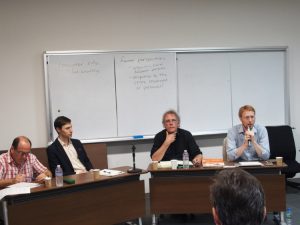
Dr. McGreevy (RIHN) catalogued the growing number and strength of alternative food movements in his presentation “Rural Sustainable Development in Japan: Will the seeds of transition take root?” Although many in the audience were aware of individual agri-food initiatives in Japan, Dr. McGreevy demonstrated how significant and viable this new movement has become.
The scope and relevance of the alternative agriculture movement at a world-wide level was further emphasised by Prof. Altieri (University of California, Berkeley) in his presentation on the “Science and Politics of Agroecology”. For him, movements such as Satoyama in Japan are a local reflection of agroecology, the worldwide effort by peasants to gain recognition for both their contribution to healthy ecosystems and achievements in producing food for much of the world. He cautioned, however, that politicians and big agricultural institutions often ignore the transformative potential of peasant agriculture by reducing agroecology to one instrument in a toolbox to achieve sustainable intensification. His advice for the future is to help nurture the potential of agroecology by adopting a “social perspective which takes into account the rights of the poor”.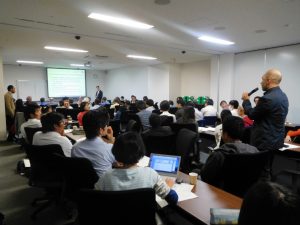
The theme of supporting peasant rights as a mechanism for achieving agricultural development was further underlined by Prof. van der Ploeg in his speech “Revisiting the Structure/Agency Debate and its Implications for Peasant Studies”. His surprising message was that peasants are not a remnant of the past but very much an active agent in innovating adaptive agricultural methods. He established this by highlighting three underappreciated trends: 1) despite policy disadvantages, small and medium farms did not disappear, but remained a foundation for food security; 2) large high-tech farms are increasingly vulnerable to a new era of market volatility; and 3) the political bias towards large farms is increasingly counterproductive.
The roundtable discussion moderated by Dr. Feuer with these three speakers gave the audience an opportunity to raise discussions about future policy, the challenging institutional environment for alternative agriculture, and the role of researchers.
Workshop Excursions
The last part of the workshop helped many of the concepts and theories discussed come alive in the field. On 26-27 of May, the workshop participants visited rural villages in Ayabe City of northern Kyoto prefecture, as well the nearby city of Kameoka to experience more urban, technological trends in agriculture. The first visit was the Satoyama Net (Kajiya-Cho) where the participants discovered the revitalisation approaches of a depopulated village. This was followed by a visit and lunch at the house of Mr. and Ms. Kaneda’s, a family of new entry farmers making a livelihood from organic farming, hunting and carpentry in Shigasato-Cho village. The last visit of the first day ended at a rural marginal village, Kambayashi Oitomi-Cho, which has suffered depopulation during the previous decades, but has started to recover through the activities of the local community. 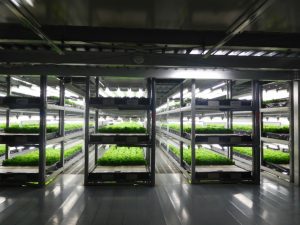
The second day of the workshop excursion included a visit to a high-tech indoor farming facility and JA’s large farmers’ market “Tawawa Asaragi”, both located in Kameoka city. Tawawa Asaragi is a unique place where customers around Kameoka can directly purchase fresh and high quality (but not necessarily organic) farm products. Despite the fact that prices are a bit higher compared to supermarkets, Tawawa Asaragi’s products are usually sold out before noon. The strong social relation between customers and farmers demonstrates that price is not the only element that matters in food, and that customers strongly desire alternative ways to access good quality food and support nearby farming systems. After a short visit of the shop (and shopping), the group headed to the indoor lettuce facility of SPREAD Co., Ltd. The participants were welcomed by the Chief Executive Officer Mr. Shinji Inada and the director of global strategies of the company. The tour started with a presentation of the company’s operations and the technology it uses in the production of lettuce in a controlled environment. The production process is fully automated. It uses less water compared to outdoor farming. and features efficient processes for recycling, filtering and maintaining sterility. While promising in some respects, the future role of such new technology in society has not been sufficiently debated. This is an important challenge for the AGST project and the researchers both at KU and WU, since this type of “agriculture” is sometimes called the “Dutch Model”. Similar advancements have long been promoted in the Netherlands and are now viewed as a potential model for Japan. In fact, this topic will be jointly researched by Prof. Hisano and Dr. Jongerden with help from a group of the students of KU and WU in the coming few years.
